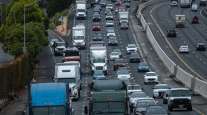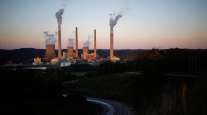Fresno Heat and Foul Air Set Stage for Trump Tailpipe Debate

To test how Americans feel about its plan for rolling back car and truck pollution standards, the Trump administration will hold an initial public hearing Sept. 24 in Fresno, Calif., a place where it might reasonably expect a friendly response.
Fresno lies in the Central Valley, California’s farm belt, where people drive pickups more out of necessity than fashion and where, according to the California New Car Dealers Association, the share of zero-emissions and hybrid new-vehicle sales account for less than half what they do in San Francisco. Fresno also is represented in Washington by Congressman Devin Nunes, a Donald Trump loyalist who once described climate change as nonsense.
“The Central Valley supported Trump over Hillary Clinton and its auto dealers have been plaintiffs in cases challenging California’s emissions standards,” said Ann Carlson, a University of California at Los Angeles law professor. “This is ironic because the auto standards Trump wants to repeal would go along way toward cleaning up the valley’s air pollution.”
Fresno also happens to be the fourth most ozone-polluted city in the United States, according to the American Lung Association, and in July experienced a record 22 straight days with 100 degree-plus high temperatures.

Fresno's location in California. (DemocraticLuntz/WikiMedia)
It’s that type of paradox on climate change that environmentalists are likely to highlight for regulators when they hold the first of three public hearings Sept. 24 on the administration’s plans. Last month, the Environmental Protection Agency and the National Highway Traffic Safety Administration proposed freezing fuel-efficiency requirements for autos at 37 miles per gallon in 2020 instead of rising to 47 mpg by 2025 under Obama-era regulations. This would cap emissions standards, too.
The hearing is scheduled to last seven hours or until anyone who’s in line gets a chance to comment. Each speech will be limited to three minutes. The agencies will hold similar hearings Sept. 25 in Dearborn, Mich., and Sept. 26 in Pittsburgh. They expect to complete their amended rules by early next year.
As the activists line up to speak, California leaders are actively pursuing the idea of compromise with Trump. The state has formally linked its tailpipe standards to the federal government’s since 2009.
U.S. automakers plan to testify that they hope this link will continue, since the alternative could be years of litigation and a patchwork of standards that vary from state to state.
“We urge the EPA and NHTSA to continue to work with all stakeholders, including California, to develop a lasting rule that enables manufacturers to plan and build a single fleet of vehicles for the U.S.,” Steve Douglas, senior director of energy and the environment for the Alliance of Automobile Manufacturers, said in prepared remarks.
Dan Sperling, a member of California Air Resources Board, said he hopes to preserve this link, too, since it helps the state to defend its own programs and influence national policy. “Some compromise will be necessary," he said.
At a San Francisco climate conference last week, CARB Chair Mary Nichols said administration officials have reached out to her in good faith to negotiate over the proposed rollback. She said she’s responding in kind but not unconditionally.

Nichols
Nichols said she’d refused to negotiate on the state’s zero-emissions vehicle mandate but made no mention of talks over greenhouse gas standards themselves. She said she had refused to bargain as long as the Trump team maintained its claim that only the federal government, and not California or any other state, can regulate tailpipe emissions. At that point, she said, the Trump people nodded and kept on talking.
NHTSA representatives didn’t respond to e-mails seeking comment on the hearing location or the ongoing negotiations.
The Sept. 24 hearing won’t be a time for talks, but rather, for posturing that indicates how polarized the debate has become.
“What the administration has proposed is so aggressive it’s hard to see how they can walk it back and find common ground with California now,’’ said Sean Donahue, a Washington environmental lawyer, in an interview prior to the hearing.
Donahue said he planned to attack the administration’s claim that by slowing pace at which new vehicles get more expensive, the rollback will save money and lives by helping people replace older and less-safe cars more rapidly. “They’re using unprecedented arguments to take a 180-degree turn from what these same agencies were saying a couple years ago,’’ he said.

Becerra
In a conference call with reporters Sept. 21, California Attorney General Xavier Becerra said the state has no choice but to defend and strengthen its pollution standards. The Los Angeles area recently completed 87 consecutive days of excessive smog, the longest stretch in 20 years, he said.
On the pro-Trump side, Thomas Pyle is equally pessimistic about compromise, and equally convinced his view would prevail in court.
“The ideology of Mary Nichols is very clear: She views the internal combustion engine as the enemy of the planet,’’ said Pyle, president of the American Energy Alliance in Washington. “I can’t imagine her negotiating with Trump and then standing on a podium to declare victory.’’
In prepared remarks for the Sept. 24 hearing, Nichols describes the Trump rollback as a “recipe for disaster” because it would fuel what the administration expects to be a near doubling in the current amount of carbon dioxide in the atmosphere. CO2 would rise to just short of an “astonishing” level of 800 parts per million under administration projections, she says. “Already, California is on fire and confronting drought and rising seas,” Nichols says.
In a recent regulatory filing, California described itself as “an independent co-regulator for the light-duty vehicle industry.” A dozen other states, which together with California constitute about a third of the U.S. vehicle market, have adopted tailpipe emissions rules that mirror Sacramento’s.

Malloy
On the Sept. 21 conference call, Connecticut Gov. Dannel Malloy said his state needs pollution standards that mirror California’s partly because it’s located downwind from the Midwest industrial heartland. “When the air gets here, it’s already polluted,” he said. “And now the EPA wants to take away one of the tools we can use to offset that pollution.
“One thing we should start doing in this country is naming hurricanes after car companies and car models,” Malloy said. “That might bring home to people how much pollution comes from automobiles, and how much damage is being done.”
With assistance by Jennifer A Dlouhy.




